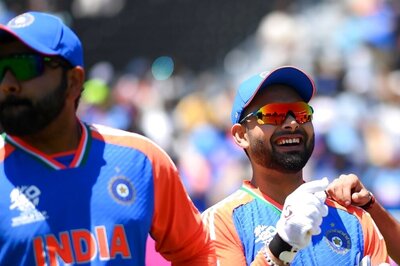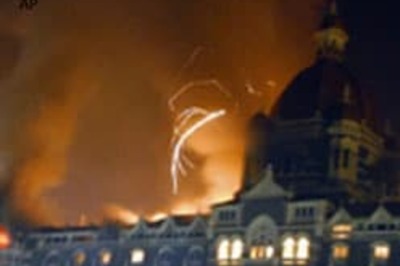
views
Even while not living here I had seen it all. The sea, chowpattys or beaches, shanties, chawls and highrises, suburban railway, gangsters, Helen, Padma Khanna and Bindu's cabaret numbers (sight of whose gyrating waists and deep belly buttons would for reasons inexplicable excite even a five-year old) and of course the great Bollywood factory, whose images fed a fertile imagination. For a toddler those images were impressionable.
Housing was so hard to get and expensive that it broke relationships. Pot-bellied millionaires kicked shoeshine boys around outside the Mahalaxmi racecourse. Newcomers had their only piece of belonging snatched on arrival at the station. Couples not only found privacy in outdoors but also ran around trees at the first hint of excitement. Mafia shootouts occurred in broad daylight at the slightest provocation. It looked like a terrible, sinful city. A place, that I resolved, I would never want to live in.
With time the child grew up. When I finally visited the islands of what had by then become Mumbai, I discovered many things new. Though everyone was out here to make money, but unlike in Delhi, cabbies didn't cheat. The overworked and overburdened trains that ferried the city back and forth still managed to keep to their timings. Roads were narrow but the traffic was far more disciplined. And despite a few unfortunate incidents, women still moved around unmolested. And any true-blue Mumbaikar was quick in appreciating a good job.
After five years in PR and corporate communications my return to journalism was also marked by the shift to television and Mumbai in the April of '06. Housing was indeed a problem. For the first time I discovered the concept of one-room apartments. I finally zeroed down and moved into one in Bandra.
After over a year and a half here, I have allowed myself to fall in love with the city. It has been an eventful time. I have had first hand experience of a major power cut and July 26 floods last year, and July 11 train blasts this year. Yet, in the aftermath of each of the following events that shook the city there was no breakdown of law and order unlike in New York. And each time the administrative machinery collapsed, ordinary citizens came forward to put the city back on track. The city picked up the pieces and quietly continued on its course. Giving television channels and newspapers the gist to gaga its undying resilience.
In a large part it's true. An important lesson that this place teaches you about karma - come what may, one must never flag in one's duty. Move on dude!
Yet, we - who spit on the railway platforms, litter the sidewalks, allow illegal buildings to come up in the already scarce space - despite our pious assertions of Aamchi Mumbai how much do we really care for the city? This schizophrenia of a city that generates about 40 per cent of the country's gross national product is akin to the cracks on the façade most upmarket addresses to acquire which one might have paid a neat pile. In this background, any protestations to the contrary are like the sterile polythene bags fluttering in the sea breeze on the ever-depleting mangroves along Carter Road.
For the majority of us, Mumbai is like the most nubile dancer at the now defunct dance bars, who everyone loved while also bewailing the fact that she enticed them to visit there night after night. Similarly, everyone loves Mumbai, yet nobody seems to give a damn when it comes to improving the quality of life.
Life that is as much yours as it is mine. Just like the city, that is as much your home as mine. The air traffic congestion over the airport continues when you take the road to reach somewhere in the southern or northern part of the city.
But I remain an optimist. The desire to improve his life has taken man from being a hunter-gatherer to a more evolved stage. For Mumbai too, things will not improve through mere activism, but by doing ones job the best. Be it as a politician, builder, bureaucrat, lawyer, journalist, adman or geek. While the mafia can make a beginning by taking itself a little less seriously. That will be the first step towards change.
Still, some things will remain the same. I continue to love belly buttons.
first published:February 14, 2007, 14:11 ISTlast updated:February 14, 2007, 14:11 IST
window._taboola = window._taboola || [];_taboola.push({mode: 'thumbnails-mid-article',container: 'taboola-mid-article-thumbnails',placement: 'Mid Article Thumbnails',target_type: 'mix'});
let eventFire = false;
window.addEventListener('scroll', () => {
if (window.taboolaInt && !eventFire) {
setTimeout(() => {
ga('send', 'event', 'Mid Article Thumbnails', 'PV');
ga('set', 'dimension22', "Taboola Yes");
}, 4000);
eventFire = true;
}
});
window._taboola = window._taboola || [];_taboola.push({mode: 'thumbnails-a', container: 'taboola-below-article-thumbnails', placement: 'Below Article Thumbnails', target_type: 'mix' });Latest News
Bombay. My first images of the city are from films that I saw at Delhi's Chanakya cinema with my parents. In the late 70s, of ABBA and BoneyM and an angry young Amitabh Bachchan, while Delhi was a quiet city Mumbai had something or the other happening all the time.
Even while not living here I had seen it all. The sea, chowpattys or beaches, shanties, chawls and highrises, suburban railway, gangsters, Helen, Padma Khanna and Bindu's cabaret numbers (sight of whose gyrating waists and deep belly buttons would for reasons inexplicable excite even a five-year old) and of course the great Bollywood factory, whose images fed a fertile imagination. For a toddler those images were impressionable.
Housing was so hard to get and expensive that it broke relationships. Pot-bellied millionaires kicked shoeshine boys around outside the Mahalaxmi racecourse. Newcomers had their only piece of belonging snatched on arrival at the station. Couples not only found privacy in outdoors but also ran around trees at the first hint of excitement. Mafia shootouts occurred in broad daylight at the slightest provocation. It looked like a terrible, sinful city. A place, that I resolved, I would never want to live in.
With time the child grew up. When I finally visited the islands of what had by then become Mumbai, I discovered many things new. Though everyone was out here to make money, but unlike in Delhi, cabbies didn't cheat. The overworked and overburdened trains that ferried the city back and forth still managed to keep to their timings. Roads were narrow but the traffic was far more disciplined. And despite a few unfortunate incidents, women still moved around unmolested. And any true-blue Mumbaikar was quick in appreciating a good job.
After five years in PR and corporate communications my return to journalism was also marked by the shift to television and Mumbai in the April of '06. Housing was indeed a problem. For the first time I discovered the concept of one-room apartments. I finally zeroed down and moved into one in Bandra.
After over a year and a half here, I have allowed myself to fall in love with the city. It has been an eventful time. I have had first hand experience of a major power cut and July 26 floods last year, and July 11 train blasts this year. Yet, in the aftermath of each of the following events that shook the city there was no breakdown of law and order unlike in New York. And each time the administrative machinery collapsed, ordinary citizens came forward to put the city back on track. The city picked up the pieces and quietly continued on its course. Giving television channels and newspapers the gist to gaga its undying resilience.
In a large part it's true. An important lesson that this place teaches you about karma - come what may, one must never flag in one's duty. Move on dude!
Yet, we - who spit on the railway platforms, litter the sidewalks, allow illegal buildings to come up in the already scarce space - despite our pious assertions of Aamchi Mumbai how much do we really care for the city? This schizophrenia of a city that generates about 40 per cent of the country's gross national product is akin to the cracks on the façade most upmarket addresses to acquire which one might have paid a neat pile. In this background, any protestations to the contrary are like the sterile polythene bags fluttering in the sea breeze on the ever-depleting mangroves along Carter Road.
For the majority of us, Mumbai is like the most nubile dancer at the now defunct dance bars, who everyone loved while also bewailing the fact that she enticed them to visit there night after night. Similarly, everyone loves Mumbai, yet nobody seems to give a damn when it comes to improving the quality of life.
Life that is as much yours as it is mine. Just like the city, that is as much your home as mine. The air traffic congestion over the airport continues when you take the road to reach somewhere in the southern or northern part of the city.
But I remain an optimist. The desire to improve his life has taken man from being a hunter-gatherer to a more evolved stage. For Mumbai too, things will not improve through mere activism, but by doing ones job the best. Be it as a politician, builder, bureaucrat, lawyer, journalist, adman or geek. While the mafia can make a beginning by taking itself a little less seriously. That will be the first step towards change.
Still, some things will remain the same. I continue to love belly buttons.



















Comments
0 comment